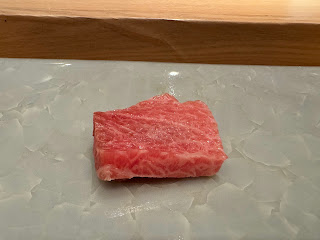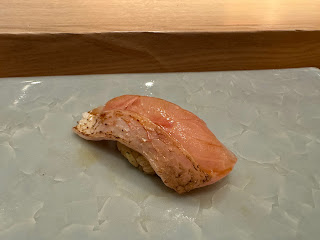This sushi restaurant is located in
Baskerville House in Central and is in fact where Sushi Sase Hanare used to be.
After Chef Sase has moved back to Hokkaido, it took a while before this
restaurant is re-opened, now under another Japanese chef, Chef Junji Ito.
On this night we come to the familiar small
restaurant, through the sliding door which leads to a sushi counter with eight
seats. There are already a foreign family of three started, and we are the
other two customers. With Chef Junji back in Japan, we are being served by his
assistant, Chef Ivan, on the night.
The Omakase Menu is $1,580 each, with an
additional $300 if going for also the abalone. I also order a bottle of
Nabashima ($1,780) to enjoy with the food. To start we have Hirame
平目 from Aomori, seasoned with a bit of yuzu zest. The olive flounder has
a firm bite, with the skirt muscle nicely chewy. The taste is mild but
delicate.
The chef apologizes to us that he has run
out of Chu-Toro so for the next piece he serves us O-Toro
大とろ instead. The fatty tuna, from Canada, has been aged for two weeks.
On the bite the fish oil seeps out to the mouth, highly flavourful and
delicious. It is our lucky day.
Next it is Katsuo
鰹, with the skipjack tuna smoked over hay to infuse the lean flesh with
fragrant smoky aromas, and the chef has prepared a soy sauce with ginger and
scallions to pair, bringing forth the umami for the best effects.
Chef Ivan then serves us Kinki
喜知次, with the channel rockfish lightly poached and served in a clear
broth prepared from the bones of the fish, with a lot of chives added. Both the fish
and the broth are very rich in flavours, but the latter is very sweet, not sure
that is the style or just having too much sugar.
Retrieving the Tako
章魚 from the tray, Chef Ivan cuts several pieces of octopus tentacles
for us. The octopus is from Hokkaido, having been slow cooked to soften the texture,
requiring no effort to chew. Adding a bit of mustard to season, it is nice and
tasty.
The chef then takes out two large Hotategai
帆立貝 and grills them on the stove, before
serving to us wrapped in a crispy nori. The scallop has a caramelized surface
to bring forth the sweetness, while the inside is soft and juicy. A strongly
umami delicacy.
Next is the additional course, the
steaming hot Ezo-Awabi
蝦夷鮑 taken out from the
kitchen. Chef Ivan first put some of the liver paste on the tray together with shari, before cutting the abalone into thick slices and put on top. The
abalone has been steamed for long hours, so it is very soft and not chewy in
texture, and on each bite the flavours come bursting forth.
Then comes Kuromutsu
黒鯥, and the prized deep-water bluefish is famous for its fattiness. Grilled
to vitalize the fish oil to the full extent, the chef has added some pickled
onions on top to balance, with a touch of sesame. Highly flavourful and it is
apparent why this is one of the favourites for many people.
Coming to the sushi part of the menu, the
first piece is Kinmedai
金目鯛. The splendid
alfonsino has a tender texture, with a clean and delicate taste.
The second piece features Shiro-Ebi
白海老, with the chef using a shiso leaf to hold the baby white shrimps in
kneading the sushi. The mushy texture is memorable, with also good sweetness.
The third piece features O-Toro
大とろ, the same fatty tuna served earlier. Very rich in fish oil and
flavours.
Next comes Akami
赤身, with the lean tuna having good sourness and tender. It might not
have the same silky-smooth texture compared with those in which the tuna is
dipped in shoyu to briefly marinate, but equally it has less saltiness which
can highlight the original flavours.
The fifth piece features Hokkigai
北寄貝. Chef Ivan has briefly grilled the surf clam to bring out its
sweetness, with each bite filling the mouth with a very nice umami taste.
The sixth sushi is Aji
鯵. The Oita horse mackerel is fatty, with a great tenderness on the
bite. Added with a touch of grated ginger it has great taste and is one of my
favourites sushi in the evening.
The seventh piece features Akamutsu
赤鯥. The Nagasaki rosy seabass is another prized fish which also got
good fattiness, with the chef torching the skin to exuberate the wonderful flavours,
doing it just right to avoid melting the fish oil to the degree of dripping.
The eighth and final piece is Aka-Uni
赤海胆. The seasonal red sea urchin is creamy and without any weird taste.
On my request Chef Ivan has made an
additional Shiro-Ika
白烏賊. Meticulously
cutting the Fukuoka white squid into thin strips he uses the same techniques to
knead the sushi with the help of a shiso leaf. The texture is very soft and without
any rubbery mouthfeel.
Finishing with a Red Miso Soup to warm the
stomach, with the dessert being a slice of Melon, very sweet and juicy. With
satisfaction, it is a pleasant meal overall, having fresh ingredients of good
quality and generous portions.
Service is good, with the staff attentive
to help pour sake throughout the meal, and Chef Ivan friendly and having good
conversations with us. The bill on the night is very reasonable at $6,094.
I look forward to returning and see what additional wonders Chef Junji can
offer.

















































